Unit7知识点总结
八年级上人教版英语UNIT7知识点
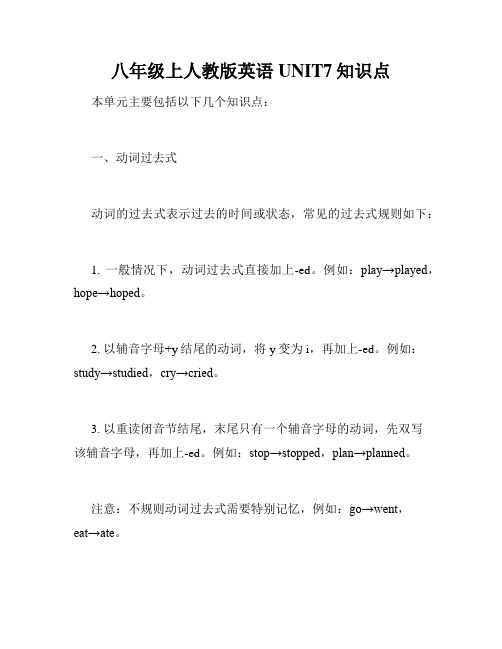
八年级上人教版英语UNIT7知识点本单元主要包括以下几个知识点:一、动词过去式动词的过去式表示过去的时间或状态,常见的过去式规则如下:1. 一般情况下,动词过去式直接加上-ed。
例如:play→played,hope→hoped。
2. 以辅音字母+y结尾的动词,将y变为i,再加上-ed。
例如:study→studied,cry→cried。
3. 以重读闭音节结尾,末尾只有一个辅音字母的动词,先双写该辅音字母,再加上-ed。
例如:stop→stopped,plan→planned。
注意:不规则动词过去式需要特别记忆,例如:go→went,eat→ate。
二、情态动词的用法情态动词表示说话人对某种情态的看法或态度,常见的情态动词有can、could、may、might、shall、should、will、would、must 等。
情态动词的用法如下:1. 表示能力、许可、请求等。
例如:can、could、may、might 等。
2. 表示义务、责任等。
例如:must、should等。
3. 表示预测或假设。
例如:will、would等。
4. 表示劝告、建议。
例如:should、ought to等。
5. 表示肯定、否定、疑问等。
例如:will、would、can、could、should、must等。
三、过去进行时过去进行时表示过去某一时刻正在进行的动作。
构成方式为was/were+动词的现在分词。
例如:I was listening to music at 8o'clock yesterday evening.四、短语动词短语动词指由一个动词和一个或多个副词、介词或形容词构成的习惯用语。
常见的短语动词有look after、break down、take off、put on等。
短语动词的意义与原来的动词意义不同,需要特别注意。
五、不定式不定式是由to+动词原形构成的,具有名词和动词的特点,可以作为动词、形容词和副词的宾语、主语、表语等。
unit-7-Will-people-have-robots知识点总结(推荐文档)
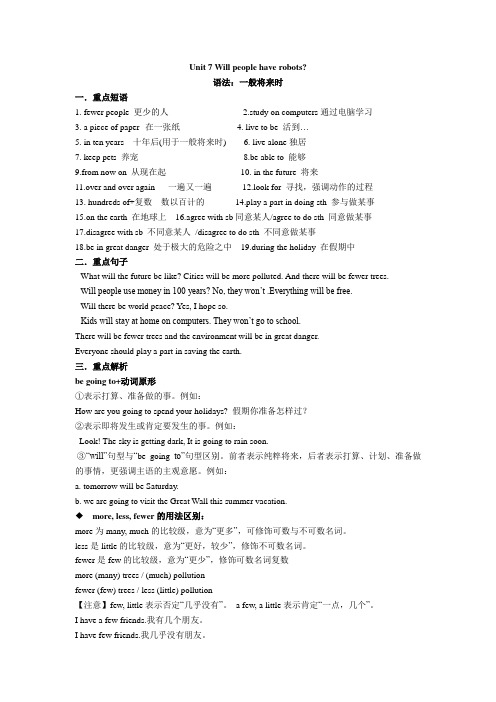
Unit 7 Will people have robots?语法:一般将来时一.重点短语1. fewer people 更少的人2.study on computers通过电脑学习3. a piece of paper 在一张纸4. live to be 活到…5. in ten years 十年后(用于一般将来时)6. live alone独居7. keep pets 养宠8.be able to 能够9.from now on 从现在起10. in the future 将来11.over and over again 一遍又一遍12.look for 寻找,强调动作的过程13. hundreds of+复数数以百计的14.play a part in doing sth 参与做某事15.on the earth 在地球上16.agree with sb同意某人/agree to do sth 同意做某事17.disagree with sb 不同意某人/disagree to do sth 不同意做某事18.be in great danger 处于极大的危险之中19.during the holiday 在假期中二.重点句子--What will the future be like? Cities will be more polluted. And there will be fewer trees.--W ill people use money in 100 years? No, they won’t .Everything will be free.--Will there be world peace? Yes, I hope so.--Kids will stay at home on computers. They won’t go to school.There will be fewer trees and the environment will be in great danger.Everyone should play a part in saving the earth.三.重点解析be going to+动词原形①表示打算、准备做的事。
人教版英语九年级Unit 7知识点总结

九年级Unit 7 Teenagers should be allowed to choose their own clothes. 讲义一、词性转换Section A1. safety→ (adj.) safe2. part-time → (反义词.) full-time3. badly → (adj.) bad4. educate → (n.) education5. manage → (n.) management Section B6. enter → (n.) entrance7. choice → (v.) choose二、短语归纳1. be worried about 为…担心2. have part-time jobs做兼职工作3. get one’s ears pierced打耳洞4. be excited about对…感到兴奋5. take lots of photos拍许多照片6. by my side在我身边7. through the field穿过田间8. make sure确信9. keep…from…使…避开…10. give sb. a hug给某人一个拥抱11. talk back顶嘴12. listen to sb.听某人说13. agree with sb.赞同某人14. learn…from…向…学习…15. keep…away from…使…避免接近…;使…远离…16. make one’s own decisions 自己做决定17. manage one’s own life应付自己的生活18. be strict with sb. 对某人要求严格19. get in the way of挡…的路;妨碍20. achieve one’s dreams实现某人的梦想21. how much多么22. end up结束23. be serious about认真对待…24. care about关心25. make this choice做出这个选择26. in the end最后27. keep off关闭1. be allowed to do sth. 被允许做某事2. stop doing sth. 停止做某事3. get sth. done使某事被做4. should do sth. 应该做某事5. what to do做什么6. need to do sth. 需要做某事7. spend time with sb. 与某人共度时光8. be excited about doing sth.对做某事感到兴奋9. hurt oneself伤到自己10. give sth. to sb.把某物给某人11. regret doing sth. 懊悔做某事12. allow sb. to do sth. 允许某人做某事13. practice ding sth. 练习做某事14. take care of oneself照顾自己15. start doing sth. 开始做某事16. continue to do sth. 继续做某事17. see sb. do sth. 看见某人做过某事18. love doing sth. 喜欢做某事19. have nothing against doing sth.不反对做某事20. have a chance to do sth. 有机会做某事21. spend more time on sth. 在某事上花费更多时间三.重点句子1. I don’t think sixteen-year-olds should be allowed to drive. 我认为不应该允许16虽的青少年开车。
人教版英语九年级Unit7单元知识点归纳
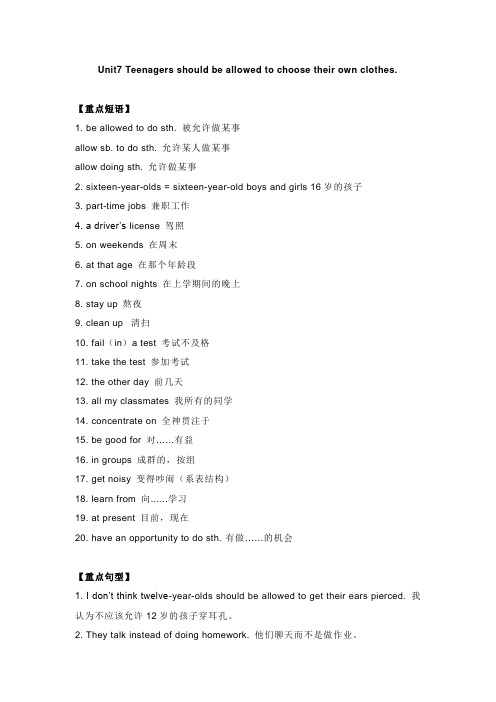
Unit7 Teenagers should be allowed to choose their own clothes.【重点短语】1. be allowed to do sth. 被允许做某事allow sb. to do sth. 允许某人做某事allow doing sth. 允许做某事2. sixteen-year-olds = sixteen-year-old boys and girls 16岁的孩子3. part-time jobs 兼职工作4. a driver’s license 驾照5. on weekends 在周末6. at that age 在那个年龄段7. on school nights 在上学期间的晚上8. stay up 熬夜9. clean up 清扫10. fail(in)a test 考试不及格11. take the test 参加考试12. the other day 前几天13. all my classmates 我所有的同学14. concentrate on 全神贯注于15. be good for 对…...有益16. in groups 成群的,按组17. get noisy 变得吵闹(系表结构)18. learn from 向......学习19. at present 目前,现在20. have an opportunity to do sth. 有做……的机会【重点句型】1. I don’t think twelve-year-olds should be allowed to get their ears pierced. 我认为不应该允许12岁的孩子穿耳孔。
2. They talk instead of doing homework. 他们聊天而不是做作业。
3. He is allowed to stay up until 11:00 pm. 允许他们熬到晚上11点。
九年级英语unit7知识点总结

九年级英语unit7知识点总结九年级英语Unit 7知识点总结在九年级英语的学习中,Unit 7是一个重要的学习单元。
本单元主要涉及旅游和地理方面的知识点,包括旅游目的地介绍、方位与方向、地理位置、交通方式等。
下面将对该单元的知识点进行总结。
一、旅游目的地介绍在旅游目的地介绍方面,我们需要掌握如何形容一个地方,介绍该地方的风景、气候、历史等特点。
我们可以使用形容词和副词来描述,并使用适当的句型进行展示。
例如,我们可以用“beautiful”(美丽的)、“fascinating”(迷人的)来形容一个地方的风景;用“hot”(炎热的)、“sunny”(阳光明媚的)来描述气候;用“historical”(历史的)、“cultural”(文化的)来描述一个地方的历史和文化。
二、方位与方向在旅游中,了解方位和方向非常重要,以便我们能够准确地找到目的地或参考地图。
方位词(prepositions)如“in front of”(在……前面)、“behind”(在……后面)、“next to”(紧挨着)、“opposite”(对面)等可以帮助我们描述一个地方的位置关系。
此外,方向词(directions)如“turn left”(向左转)、“go straight”(直走)、“at the end of”(在……的尽头)、“just around the corner”(拐角处)等可以帮助我们指引路线。
三、地理位置在旅游中,我们常常需要了解地方的地理位置。
我们可以使用固定句型来表达地方的位置,如“A is located in B”(A位于B)、“A lies to the north/south/east/west of B”(A位于B的北方/南方/东方/西方)等。
同时,了解国家、城市和大陆的位置也是很重要的。
我们可以使用适当的介词及固定表达来描述,例如“China is in Asia”(中国位于亚洲)、“London is in the United Kingdom”(伦敦位于英国)。
八年级unit7知识点总结

八年级unit7知识点总结八年级Unit 7知识点总结作为初中学生,我们每学完一个单元就需要对所学知识点进行总结,以便加深记忆和掌握。
在这里,本文将为大家总结八年级Unit 7的知识点,包括语法、单词、短语和句型。
一、语法部分1.一般现在时:表示现阶段的事物或状态,以及客观存在的事实和真理。
在此时态中,动词没有人称和数的变化,主语是第三人称单数。
2.一般过去时:表示过去某个时间发生的动作或状态,动词变形规则为:动词的过去式(第二形式)。
3.动词不定式:是动词的一种时态,有"to + 动词原形"构成,常用主语+动词不定式做宾语、主语+动词不定式做表语和主语+系动词+动词不定式做表语。
4.情态动词:表示说话人的情感、意愿、推测、建议、批评等语气。
如:can, could, should, must, might等。
5.条件状语从句:表示条件、假设的情况,引导词有:if, unless, on condition that, provided that, in case等。
二、单词和短语部分1.双倍:twice2.倍数:multiple3.某些;几个:some4.一点儿也不;没有:none5.住宅区:residential area6.多汁的:juicy7.市中心:downtown三、句型部分1.My uncle is going to Japan next month.(现在进行时)我的叔叔下个月要去日本。
2.I visited many places in my city during the summer vacation.(一般过去时)我在暑假期间参观了我的城市的许多地方。
3.She is easy to talk to.(形容词短语作表语)她很容易相处。
4.If it rains tomorrow, we will stay at home.(条件状语从句)如果明天下雨,我们会呆在家里。
unit_7_Will_people_have_robots知识点总结
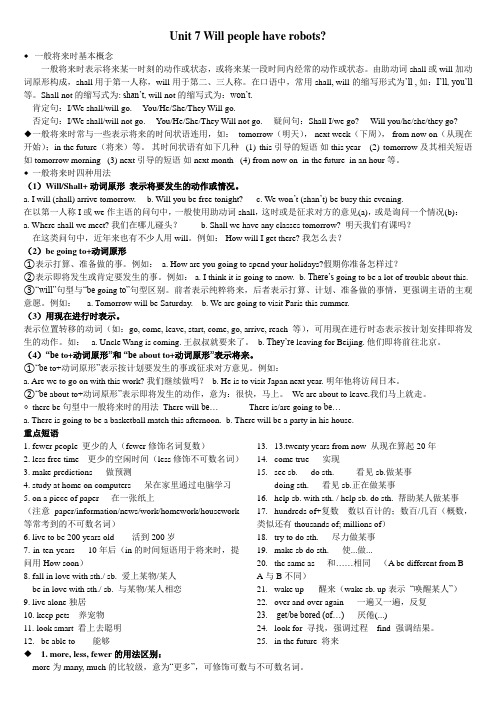
Unit 7 Will people have robots?◆一般将来时基本概念一般将来时表示将来某一时刻的动作或状态,或将来某一段时间内经常的动作或状态。
由助动词shall或will加动词原形构成,shall 用于第一人称,will用于第二、三人称。
在口语中,常用shall, will的缩写形式为’ll , 如:I’ll,you’ll 等。
Shall not的缩写式为: shan’t, will not 的缩写式为:won’t.肯定句:I/We shall/will go. You/He/She/They Will go.否定句:I/We shall/will not go. You/He/She/They Will not go. 疑问句:Shall I/we go? Will you/he/she/they go?◆一般将来时常与一些表示将来的时间状语连用,如: tomorrow(明天), next week(下周), from now on(从现在开始);in the future(将来)等。
其时间状语有如下几种(1) this引导的短语如 this year (2) tomorrow及其相关短语如tomorrow morning (3) next引导的短语如 next month (4) from now on in the future in an hour 等。
◆一般将来时四种用法(1)Will/Shall+ 动词原形表示将要发生的动作或情况。
a. I will (shall) arrive tomorrow.b. Will you be free tonight?c. We won’t (shan’t) be busy this evening.在以第一人称I或we作主语的问句中,一般使用助动词shall,这时或是征求对方的意见(a),或是询问一个情况(b):a. Where shall we meet? 我们在哪儿碰头? b. Shall we have any classes tomorrow? 明天我们有课吗?在这类问句中,近年来也有不少人用will。
八年级上unit7知识点总结

八年级上unit7知识点总结本单元主要学习了英语中的动词时态,包括一般现在时、一般过去时、一般将来时等,也学习了一些词语的用法,比如wish、hope、be going to等。
本篇文章将对此次学习内容进行总结。
一、动词时态1. 一般现在时一般现在时表示经常性的、习惯性的动作或者真理。
主语+动词(原形)+其他(如:she often reads books.)2. 一般过去时一般过去时表示过去的时间或者过去的经历。
主语+动词(过去式)+其他(如:I went to the park yesterday.)3. 一般将来时一般将来时表示将来会发生的事情。
主语+will+动词(原形)+其他(如:I will go to Beijing next month.)4. 现在进行时现在进行时表示现在正在发生的动作,或者未来已经安排好的计划。
主语+be+动词(现在分词)+其他(如:I am studying for the exam now.)5. 过去进行时过去进行时表示在过去某一时刻正在发生的动作。
主语+was/were+动词(现在分词)+其他(如:She was sleeping when he arrived.)二、词语的用法1. wishwish后面接“从句”,表示对现在或者将来情况的希望。
如:I wish I were a bird.2. hopehope 后面接“that从句”或者“从句”。
如:I hope that I can pass the exam.3. be going tobe going to 表示按照计划、打算要做什么事情。
如:I am going to have a big meal tonight.4. much、many、a lot ofmuch、many、a lot of都表示数量,不同之处在于much、many用于不可数名词以及可数名词的复数形式,而a lot of只用于肯定句中,不适用于疑问句和否定句。
部编版五年级上册英语第七单元知识总结-Unit 7知识点总结
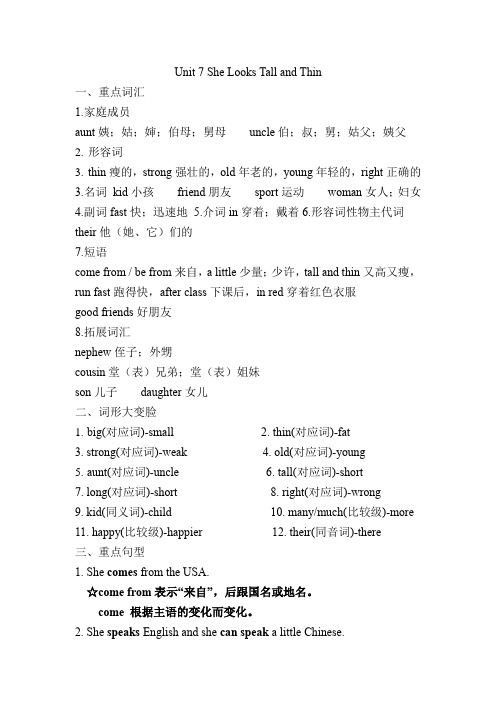
Unit 7 She Looks Tall and Thin一、重点词汇1.家庭成员aunt姨;姑;婶;伯母;舅母uncle伯;叔;舅;姑父;姨父2.形容词3.thin瘦的,strong强壮的,old年老的,young年轻的,right正确的3.名词kid小孩friend朋友sport运动woman女人;妇女4.副词fast快;迅速地5.介词in穿着;戴着6.形容词性物主代词their他(她、它)们的7.短语come from / be from来自,a little少量;少许,tall and thin又高又瘦,run fast跑得快,after class下课后,in red穿着红色衣服good friends好朋友8.拓展词汇nephew侄子;外甥cousin堂(表)兄弟;堂(表)姐妹son儿子daughter女儿二、词形大变脸1.big(对应词)-small2. thin(对应词)-fat3. strong(对应词)-weak4. old(对应词)-young5.aunt(对应词)-uncle6. tall(对应词)-short7. long(对应词)-short 8. right(对应词)-wrong9. kid(同义词)-child 10. many/much(比较级)-more11. happy(比较级)-happier 12. their(同音词)-there三、重点句型1. She comes from the USA.☆come from表示“来自”,后跟国名或地名。
come 根据主语的变化而变化。
2. She speaks English and she can speak a little Chinese.☆speak表示“说”,后跟表示语言的名词时,意为“说某种语言”。
2.She can run very fast.3.We are good friends.4.The young man beside her is my uncle.5.Who is the young woman in red? “who”问“人”6.She looks very beautiful in the red dress.☆look表示“看起来”,in后面接表示颜色的名词,意为“穿着某种颜色的衣服”。
七年级英语上册unit7知识点总结

七年级英语上册unit7知识点总结Unit 7是七年级英语上册的重点,主要是学生们初步接触到一些基础的语法、时态和词汇知识。
这里我们对整个unit 7进行了总结,希望对学生们的学习有所帮助。
一、语法知识点1. 一般现在时一般现在时是最基本的时态,用于表示现在正在进行或者经常性发生的动作。
主语+谓语动词+其他成分,例如:There is a pencil on the desk.(桌子上有一支笔。
)Do you like playing basketball?(你喜欢打篮球吗?)2. 一般过去时一般过去时用于表示过去发生的动作或状态,常与表示过去的时间状语连用,例如:I watched a film yesterday.(昨天我看了电影。
)He went to bed early last night.(昨晚他早早就睡觉了。
)3. 现在进行时现在进行时用于表示正在进行的动作,它的结构是:主语+be 动词(am/is/are)+动名词。
例如:She is singing a song.(她正在唱歌。
)They are playing football.(他们正在踢足球。
)4. 一般将来时一般将来时用于表示将来发生的动作或者状态。
它的结构是:主语+will+动词原形。
例如:I will go to the park tomorrow.(明天我要去公园。
)They will have a party next week.(下周他们要开一个聚会。
)二、词汇知识点1. 形容词形容词用来修饰名词,表示名词的特点,例如:fat(胖的),thin(瘦的),tall(高的),short(矮的)2. 动词动词是句子的谓语,表示动作或状态的变化,例如:walk(走),run(跑),swim(游泳),play(玩)3. 名词名词是句子中的主语或宾语,表示人、事、物、地点等,例如:book(书),pen(笔),car(汽车),mountain(山)4. 数词数词用来表示数量,例如:one(一),two(二),three(三),four(四)5. 代词代词用来代替名词,例如:he(他),she(她),it(它),they(他们)三、语言技能知识点1. 听力技能听力技能是英语学习中非常重要的一部分,能够帮助学生们更轻松地听懂英语。
九年级unit7知识点归纳
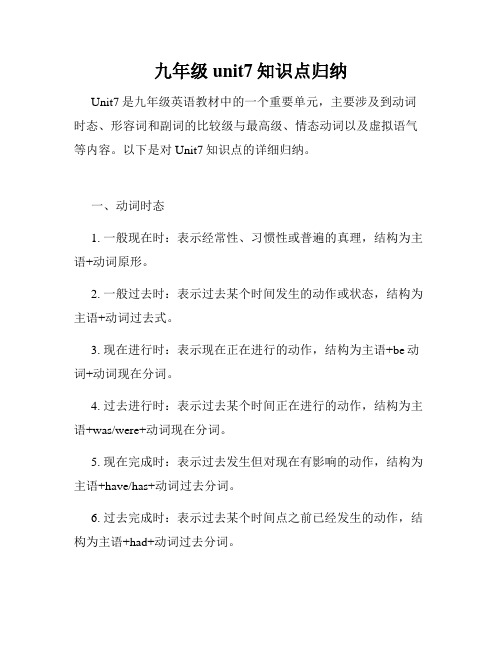
九年级unit7知识点归纳Unit7是九年级英语教材中的一个重要单元,主要涉及到动词时态、形容词和副词的比较级与最高级、情态动词以及虚拟语气等内容。
以下是对Unit7知识点的详细归纳。
一、动词时态1. 一般现在时:表示经常性、习惯性或普遍的真理,结构为主语+动词原形。
2. 一般过去时:表示过去某个时间发生的动作或状态,结构为主语+动词过去式。
3. 现在进行时:表示现在正在进行的动作,结构为主语+be动词+动词现在分词。
4. 过去进行时:表示过去某个时间正在进行的动作,结构为主语+was/were+动词现在分词。
5. 现在完成时:表示过去发生但对现在有影响的动作,结构为主语+have/has+动词过去分词。
6. 过去完成时:表示过去某个时间点之前已经发生的动作,结构为主语+had+动词过去分词。
7. 将来时:表示将来某个时间点将要发生的动作,结构为主语+will+动词原形。
二、形容词和副词的比较级和最高级1. 比较级的构成:a. 一般单音节形容词和副词:在词尾加-er,如big(bigg##er##),fast(fast##er##)。
b. 以e结尾的形容词和副词:在词尾加-r,如nice(nic##er##)。
c. 以辅音字母+y结尾的形容词:把y改为i,再加-er,如happy(happi##er##)。
2. 最高级的构成:a. 在比较级前加the,比较级后加-est,如big(thebigg##est##),fast(the fast##est##)。
b. 以e结尾的形容词和副词:在词尾加-st,如nice(nic##est##)。
c. 以辅音字母+y结尾的形容词:把y改为i,再加-est,如happy(happi##est##)。
三、情态动词情态动词包括can、could、may、might、will、would、shall、should、must等。
它们具有以下特点:1. 在肯定句中,情态动词后面跟动词原形,表示能力、可能性、推测等。
人教版七年级英语上册Unit7短语、句型、知识点总结

7.black trousers for only 22 dollars
仅卖22美元一条的黑裤子
14.two dollars for one pair= $2 for one pair
每双/条2美元
二.重要句型
1.—How much is this T-shirt?
=—What’s the price ofthis T-shir
我们卖的所有服装价格都很优惠
11.For girls, we have skirts in purple for only $20.
对于女孩子,我们有紫色的裙子,仅售$20.
我买下了。
8.价格+for+具体事物
Two dollars for one pair and three dollars for two pairs.
两美元一双,三美元两双。
e and buy your clothes at our great sale.
我们在大甩卖,快来买衣服吧
10.We sell our clothes at good prices.
—It’s seven dollars
—这件T恤衫多少钱?
—7美元
2.—How much are these socks?
=—What’s the price ofthese socks?
—They’re two dollars.
—这双短袜多少钱?
—两美元
3.—Can I help you?
—Yes, please./No, thanks.
/shorts/ trousers/
glasses
一双鞋/短袜/
/一条短裤/裤子/
六上英语unit7知识点总结
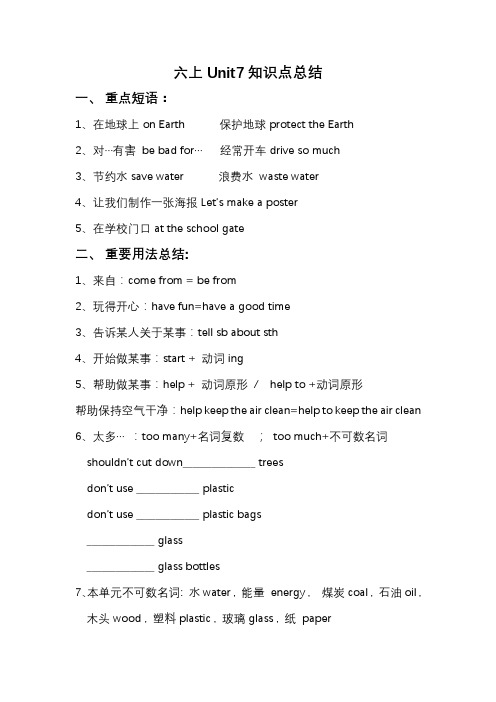
六上Unit7知识点总结一、重点短语:1、在地球上on E arth 保护地球protect the E arth2、对…有害b e bad for…经常开车drive so much3、节约水save water 浪费水waste water4、让我们制作一张海报L et’s make a poster5、在学校门口at the school gate二、重要用法总结:1、来自:come from = be from2、玩得开心:have fun=have a good time3、告诉某人关于某事:tell sb about sth4、开始做某事:start + 动词ing5、帮助做某事:help + 动词原形/ help to +动词原形帮助保持空气干净:help keep the air clean=help to keep the air clean 6、太多… :too many+名词复数;too much+不可数名词shouldn’t cut down_______________ treesdon’t use _____________ plasticdon’t use _____________ plastic bags______________ glass______________ glass bottles7、本单元不可数名词: 水water , 能量energy , 煤炭coal , 石油oil , 木头wood , 塑料plastic , 玻璃glass , 纸paper三、重点语法:1、使用use 再利用reuse 有用的useful使用/再利用某物去做某事:use/reuse sth to +动原使用水去清洗东西:use water to clean things使用木头去制作许多其他的东西:use wood to make many other things使用塑料去制作袋子和瓶子:use plastic to make bags and bottles 再利用纸去制作一个箱子:reuse paper to make a box再利用一个塑料瓶去制作一个玩具:reuse a plastic bottle to make a toy2、should 和shouldn’t 是情态动词,后面要接动词原形。
Unit 7 What's the highest mountain in the world知识点总结
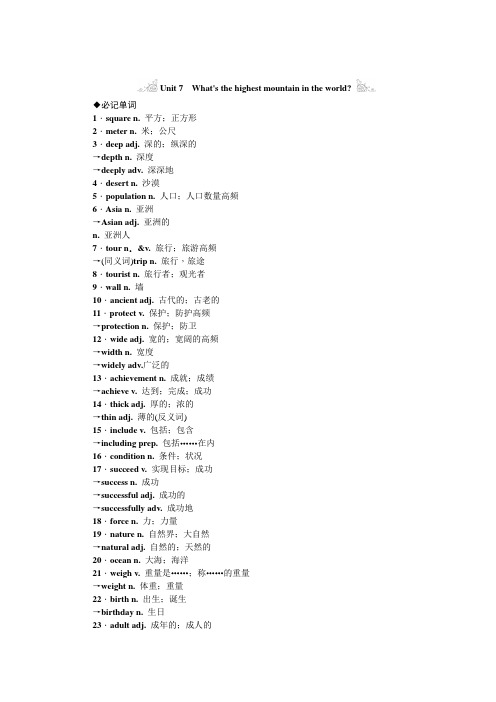
Unit 7What's the highest mountain in the world?◆必记单词1.square n. 平方;正方形2.meter n. 米;公尺3.deep adj. 深的;纵深的→depth n. 深度→deeply adv. 深深地4.desert n. 沙漠5.population n. 人口;人口数量高频6.Asia n. 亚洲→Asian adj. 亚洲的n. 亚洲人7.tour n.&v. 旅行;旅游高频→(同义词)trip n. 旅行,旅途8.tourist n. 旅行者;观光者9.wall n. 墙10.ancient adj. 古代的;古老的11.protect v. 保护;防护高频→protection n. 保护;防卫12.wide adj. 宽的;宽阔的高频→width n. 宽度→widely adv.广泛的13.achievement n. 成就;成绩→achieve v. 达到;完成;成功14.thick adj. 厚的;浓的→thin adj. 薄的(反义词)15.include v. 包括;包含→including prep. 包括……在内16.condition n. 条件;状况17.succeed v. 实现目标;成功→success n. 成功→successful adj. 成功的→successfully adv. 成功地18.force n. 力;力量19.nature n. 自然界;大自然→natural adj. 自然的;天然的20.ocean n. 大海;海洋21.weigh v. 重量是……;称……的重量→weight n. 体重;重量22.birth n. 出生;诞生→birthday n. 生日23.adult adj. 成年的;成人的n. 成人;成年动物24.bamboo n. 竹子25.research n.&v. 研究;调查(用作名词时,重音可放在第一个音节)高频26.keeper n. 饲养员;保管人→keep v. 保管27.awake adj. 醒着→asleep adj. 睡着的(反义词)28.excitement n. 激动;兴奋→excite v. 使激动→excited adj. 激动的→exciting adj. 激动人心的29.illness n. 疾病;病高频→ill adj. 生病的30.wild adj. 野生的31.government n. 政府;内阁32.oil n. 油;食用油;石油33.huge adj. 巨大的;极多的◆重点短语1.feel free (可以)随便(做某事)【拓展】be free to do sth.随意做某事2.as far as I know 就我所知高频3.run along 延伸;贯穿4.take in 吸入;吞入(体内)5.risk one's life 冒着生命危险6.in the face of 面对(问题、困难等)7.even though(=even if)即使;虽然高频8.at birth 出生时9.up to 到达(某数量、程度等);至多有;不多于10.fall over 绊倒11.take care of 照顾高频【拓展】look after 照顾12.or so 大约13.die from 死于高频【拓展】die of 死于14.cut down 砍倒;砍伐15.in the future 在将来高频16.put...into... 把……放入……17.in danger 处于危险中高频【拓展】in trouble 有麻烦in peace 处于和平18.the Pacific Ocean 太平洋19.walk into 走路时撞着◆重点句子1.Qomolangma is higher than any other mountain in the world.珠穆朗玛峰比世界上其他任何一座山更高。
人教版九年全一册Unit7 Teenagers should be 知识点总结(含短语句型精讲作文)

人教版九年级全一册英语Unit 7 知识点总结(短语+句型+精讲+作文)Unit 7 Teenagers should be allowed to choose their own clothes.一、短语归纳1. sixteen-year-olds = sixteen-year-old kids 16岁的孩子们2. go to the shopping center 去购物中心3. get one’s driver’s /driving license 取得驾驶执照4. no way 没门,不行5. have/ take part-time jobs = work part-time 做兼职工作6. get ears pierced 打耳洞7. get/have one’s hair cut 剪头发8. choose their own clothes 选择他们自己的服装9. serious enough 不够严肃10. be excited about (doing) sth. 对(做)…感到兴奋11. take lots of photos 拍许多照片12. all night 整夜13. use a flash 使用闪光灯14. stay by my side 陪伴在我的身旁15. run through the field 跑过田野16. make sure 确信17. keep sb./sth. (away) from 让某人/某物远离…18. give sb. a hug=hug sb. 拥抱某人19. lift up 举起(动副短语) lift it/them up20. talk back to sb. 跟某人顶嘴21. make one’s own decisions =decide for oneself自己做决定22. allow doing sth. 允许做某事23. allow sb. (not) to do sth. 允许某人(不)做某事24. be allowed to do sth. 被允许做某事25. cough badly 咳嗽得厉害26. go out with friends 和朋友外出27. have awful /scary dreams 做噩梦28. think back to those times 回顾过去那些时光29. stay out 待在外面30. move out 搬出去31. regret doing sth. 后悔做了某事(事已做)32. regret to do sth. 遗憾地去做某事(事未做)33. educate sb. to do sth. 教育某人做某事34. agree with sb. 同意某人的观点35. manage one’s own life 应付自己的生活36. in most Asian societies 在大多数亚洲社会37. take the test 参加考试38. pass the test 通过考试39. fail a math test 数学考试不及格40. take the test later补考41. get to class late=be late for late for class 上课迟到42. be strict in sth. 在某方面要求严格43. be strict with sb. 对某人要求严格44. get in the way of… 挡…的路,妨碍…45. suppor t one’s dream 支持某人的梦想46. teenagers under eighteen 18岁以下的青少年47. have nothing against (doing) sth. 不反对(做)某事48. be serious about…= take…seriously 对…认真,热衷于…49. spend more time on his homework在他的家庭作业上多花点时间50. care about sb. 关心/担心某人51. a professional runner 一名职业赛跑运动员52. end up as 最终成为…53. how much 多么(提问程度)54. enter university 进入大学55. make a choice (oneself) (自己)做选择56. have no choice but to do sth.除了做某事以外,别无选择57. hurt oneself 伤到自己58. have a chance to do sth. 有机会做某事59. reply to sb.= answer sb. 回答/答复某人二、词汇精讲1.choosechoose作动词,意为“选择,挑选”,后接宾语,常用搭配如下:choose sth. for sb. 为某人选择某物;choose sb. to do sth. 选择某人做某事;choose + wh从句(where,what,when等引导的特殊疑问句)例如:We has chosen a birthday present for you. 我们已经为你选择了一个礼物。
Unit7-It's-raining单元知识点总结

最新人教版Unit 7 It’s raining.单元知识点总结一、询问天气的句型及其答语.1.例句:--How’s the weather ? 天气怎么样?-- It’s cloudy./It’s sunny./It’s raining.多云./晴天./在下雨.2.询问天气的句型:常见的询问天气的句型有:How’s the weather?What’s the weather like?两个句型后面都可以加“in+ 地点”,用以询问“某地天气如何”3.回答天气状况通常用:“It’s +表示天气的形容词”。
常见的该类形容词有:fine(晴朗的)dry(干燥的) warm(温暖的) cold( 寒冷的) cool(凉爽的) hot(炎热的)rainy(下雨的)snowy(下雪的) sunny(晴朗的) cloudy(多云的)等。
同时也可以用现在进行时进行回答:It’s raining/snowing 正在下雨/ 下雪。
例句: --How’s the weather in your city?—It’s warm.--What’s the weather like in Shanghai?—It’s raining now.例1:How’s the weather in Shanghai?( 同义句转换)例2.--- ___________________---It’s sunny today.A.How was the weather yesterday?B.How are you doing?C.What fine weather!D.What’s the weather like today?例3.—How’s the weather there?---Great. It’s ______.I can make a snowman tomorrow.例4.连词成句:is What Beijing like the weather in______________________________________例5.单句改错:1.How is the weather like? ( )_________A B C D2.The weather is windy and rain. ( ) _________A B C D二、现在进行时1.例句:---What are you doing?---I am cooking.---What are they doing?---They’re playing basketball in the park.---What’s he doing?---He’s studying at his friend’s home.2.用法:(1)表示说话时动作正在发生或进行。
Unit7知识归纳人教版七年级英语下册
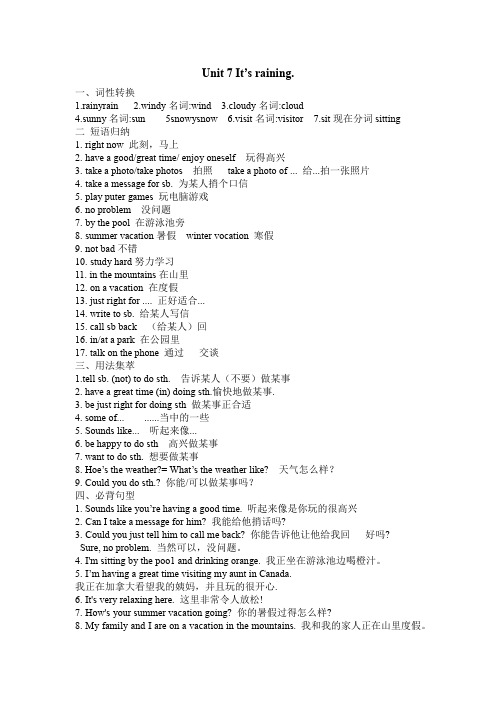
Unit 7 It’s raining.一、词性转换1.rainyrain2.windy名词:wind3.cloudy名词:cloud4.sunny名词:sun 5snowysnow 6.visit名词:visitor 7.sit现在分词sitting二短语归纳1.right now 此刻,马上2.have a good/great time/ enjoy oneself 玩得高兴3.take a photo/take photos 拍照take a photo of ... 给...拍一张照片4.take a message for sb. 为某人捎个口信5.play puter games 玩电脑游戏6.no problem 没问题7.by the pool 在游泳池旁8.summer vacation暑假winter vocation 寒假9.not bad不错10.study hard努力学习11. in the mountains在山里12. on a vacation 在度假13. just right for .... 正好适合...14. write to sb. 给某人写信15. call sb back (给某人)回16. in/at a park 在公园里17. talk on the phone 通过交谈三、用法集萃1.tell sb. (not) to do sth. 告诉某人(不要)做某事2. have a great time (in) doing sth.愉快地做某事.3. be just right for doing sth 做某事正合适4. some of... ......当中的一些5. Sounds like... 听起来像...6. be happy to do sth 高兴做某事7. want to do sth. 想要做某事8. Hoe’s the weather?= What’s the weather like? 天气怎么样?9. Could you do sth.? 你能/可以做某事吗?四、必背句型1. Sounds like you’re having a good time. 听起来像是你玩的很高兴2.Can I take a message for him? 我能给他捎话吗?3.Could you just tell him to call me back? 你能告诉他让他给我回好吗?Sure, no problem. 当然可以,没问题。
人教版九年级英语UNIT7知识点总结
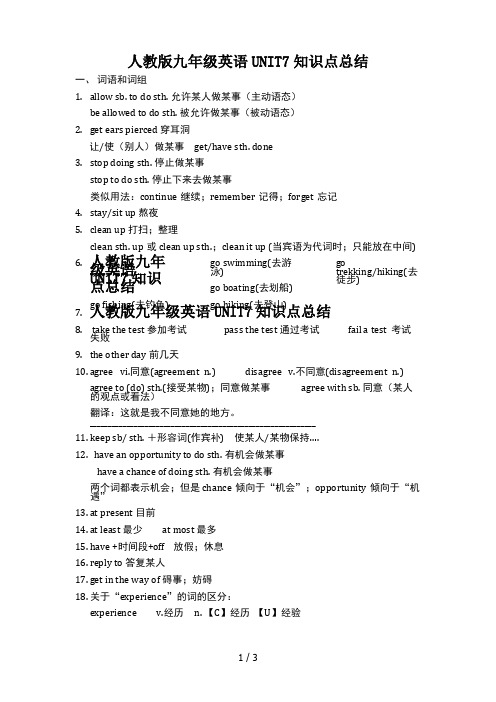
人教版九年级英语UNIT7知识点总结一、词语和词组1.allow sb. to do sth. 允许某人做某事(主动语态)be allowed to do sth. 被允许做某事(被动语态)2.get ears pierced 穿耳洞让/使(别人)做某事get/have sth. done3.stop doing sth. 停止做某事stop to do sth. 停止下来去做某事类似用法:continue继续;remember记得;forget忘记4.stay/sit up 熬夜5.clean up 打扫;整理clean sth. up或 clean up sth.;clean it up (当宾语为代词时;只能放在中间)6.人教版九年级英语UNIT7知识点总结go fishing(去钓鱼) go swimming(去游泳)go boating(去划船)go hiking(去登山)gotrekking/hiking(去徒步)7.人教版九年级英语UNIT7知识点总结8. take the test 参加考试 pass the test 通过考试 fail a test 考试失败9.the other day 前几天10.agree vi.同意(agreement n.) disagree v.不同意(disagreement n.)agree to (do) sth.(接受某物);同意做某事 agree with sb. 同意(某人的观点或看法)翻译:这就是我不同意她的地方。
_____________________________________________________________11.keep sb/ sth. +形容词(作宾补)使某人/某物保持….12. have an opportunity to do sth. 有机会做某事have a chance of doing sth. 有机会做某事两个词都表示机会;但是chance倾向于“机会”;opportunity倾向于“机遇”13.at present 目前14.at least 最少 at most 最多15.have +时间段+off 放假;休息16.reply to 答复某人17.get in the way of 碍事;妨碍18.关于“experience”的词的区分:experience v.经历 n. 【C】经历【U】经验19.关于“成功”的词的区分:人教版九年级英语UNIT7知识点总结succeed v.成功 successfully adv. 成功地successful adj.成功的人教版九年级英语UNIT7知识点总结19.think about 与think of 的区别①当两者译为:认为、想起、记着时;两者可互用例句:I often think about/ of that day. 我经常想起那天。
- 1、下载文档前请自行甄别文档内容的完整性,平台不提供额外的编辑、内容补充、找答案等附加服务。
- 2、"仅部分预览"的文档,不可在线预览部分如存在完整性等问题,可反馈申请退款(可完整预览的文档不适用该条件!)。
- 3、如文档侵犯您的权益,请联系客服反馈,我们会尽快为您处理(人工客服工作时间:9:00-18:30)。
Unit 7 知识点总结
一、单词复习
1. v. 冒烟;吸烟n. 烟
2. v. 扎;刺破;穿透
3. 证;证件
4. n. 安全;安全性
5. n. 耳环;耳饰
6. v. & n. 哭;叫喊
7. n. 田野;场地
8. n. & v. 拥抱;搂抱
9. v. 举起;抬高n.搭便车;电梯
10. 回嘴;顶嘴
11. adj. 很坏的;讨厌的
12. n. 十几岁(十三至十九岁)
13. v. 感到遗憾;懊悔
14. n.诗;韵文
15. n. 卧室
16. n. 社区;社团
17.避免接近;远离
18. n. 机会;可能性
19.自己做决定
20. v. 完成(困难);应付
21. n. 社会
22. n. 单位;单元
23. v. 教育;教导
24.挡…的路;妨碍
25. adj.职业的;专业的
26. v. 进来;进去
27. v. & n. 支持
28. adj. & adv.兼职的
29. v.扎;刺破;穿透
30.n.闪光灯;闪光v.闪耀;闪光
31. adj.极小的;微小的
32. adv. 严重地;差;非常
33. n.选择;挑选日期: ______________
二、短语A部分
1.允许某人做某事
2. 被允许做某事
3. 十六岁的孩子
4. 有兼职工作
5. 打耳洞
6. 选择他们自己的衣服
7. 担心某人的安全
8. 拿到他的驾照
9. 剪发
10. 戴那样傻的耳环
11. 和朋友共度时光
12. 需要时间做作业
13. 对某事很激动
14. 对做某事很激动
15. 毕加索的著名的画
16. 带。
到
17.用闪光灯
18.唱给我听
19.呆在我身边
20.跑过田野
21.确信
22. 使某人远离危险
23. 伤害我自己
24. 给我拥抱
25. 把我举起
26. 与。
顶嘴
27. 带给我噩梦
28.十点前
29. 想回到那时候
30. 后悔做某事
31. 搬出去
32. 从很小的年龄
33. 管理他们自己的生活34. 那就是。
的原因
三、短语B部分
1.完成一次考试
2. 担心做某事
3. 考试失败
4. 参加考试
5. 通过考试
6. 对。
严格
7.阻碍他们的学习
8. 为他们的成功担心
9. 发展他们的爱好
10. 尽他们想要的多
11. 在他们的校队
12. 一个专业的跑步运动员
13. 多训练
14. 实现他们的梦想
15. 他的每一场比赛
16. 进入大学
17. 对。
认真的
18. 做正确的事情
19. 关心某人
20. 自己做出选择
21. 有机会做某事
22.做自己的决定
23.只有那时
四、背会以下不规则动词的过去式和过去分词。
hang ___ ____have_____ _____ hear____ ____hide_____ _____ hit________ _hold_____ _____ hurt____ ____keep_____ _____ know____ ____lay_____ _____ lead___ ____learn_____ _____ leave____ ___ lend_____ _____ let_____ _____ lie_____ _____ light___ _____lose__________ make____ __mean_____ _____ meet___ __ mistake______ ___ overcome__________ _______ oversleep____ ___pay____ ___ put_____ _____read ___ ___ ride ___ ___ ring ___ ___ rise ___ ___ run___ ___
say___ ___ see___ ___
sell ___ ___ send___ ___ set_____ __ shake___ __ shine___ __ show___ ___ shut___ ___ sing___ ___
sit___ ___ sleep ___ ___ smell___ ___ speak___ ___
五、重点句子
1.父母不应该对青少年太严格。
2.皮特应该被允许随后参加考试。
3.你曾经和朋友学习吗?
4.你曾经担心考试失败吗?
5.我错过了公交车然后我不得不走去学校。
6.我不被允许上课迟到,而且今天有个大考试。
7.如果他们甚至不给我个机会我觉得不公平。
8.或许如果我解释了发生什么事,她会理解的。
9.你认为青少年应该被鼓励做他们自己的决定吗?
10.我认为十六岁的人不应该被允许开车。
11. 你认为如果我们不用闪光灯,我们可以被允许拍照吗?
12. 这些可能会阻碍他们的学习,而且父母可能担心他们在学校的成功。
家长签字:______________。
